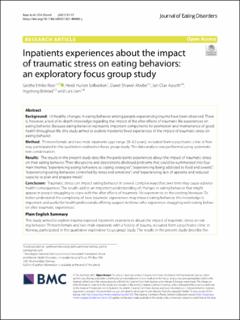| dc.contributor.author | Roer, Grethe Emilie | |
| dc.contributor.author | Hurlen Solbakken, Heidi | |
| dc.contributor.author | Abebe, Dawit Shawel | |
| dc.contributor.author | Aaseth, Jan | |
| dc.contributor.author | Bolstad, Ingeborg | |
| dc.contributor.author | Lien, Lars | |
| dc.date.accessioned | 2021-10-08T11:59:23Z | |
| dc.date.available | 2021-10-08T11:59:23Z | |
| dc.date.created | 2021-10-06T14:40:01Z | |
| dc.date.issued | 2021 | |
| dc.identifier.citation | Journal of Eating Disorders. 2021, 9 (119), . | en_US |
| dc.identifier.issn | 2050-2974 | |
| dc.identifier.uri | https://hdl.handle.net/11250/2788733 | |
| dc.description.abstract | Background
Unhealthy changes in eating behavior among people experiencing trauma have been observed. There is, however, a lack of in-depth knowledge regarding the impact of the after effects of traumatic life experiences on eating behavior. Because eating behavior represents important components for promotion and maintenance of good health throughout life, this study aimed to explore inpatients’ lived experiences of the impact of traumatic stress on eating behavior.
Method
Thirteen female and two male inpatients (age range 28–62 years), recruited from a psychiatric clinic in Norway, participated in this qualitative explorative focus group study. The data analysis was performed using systematic text condensation.
Results
The results in the present study describe the participants’ experiences about the impact of traumatic stress on their eating behavior. Their discussions and descriptions disclosed problems that could be summarized into four main themes: “experiencing eating behaviors as coping strategies”; “experiencing being addicted to food and sweets”; “experiencing eating behaviors controlled by stress and emotions”; and “experiencing lack of appetite and reduced capacity to plan and prepare meals”.
Conclusion
Traumatic stress can impact eating behavior in several complex ways that over time may cause adverse health consequences. The results add to an important understanding of changes in eating behavior that might appear in people struggling to cope with the after effects of traumatic life experiences to the existing literature. To better understand the complexity of how traumatic experiences may impact eating behavior, this knowledge is important and useful for health professionals offering support to those who experience struggling with eating behavior after traumatic experiences. | en_US |
| dc.language.iso | eng | en_US |
| dc.rights | Navngivelse 4.0 Internasjonal | * |
| dc.rights.uri | http://creativecommons.org/licenses/by/4.0/deed.no | * |
| dc.subject | Stress disorders | en_US |
| dc.subject | Post-traumatic | en_US |
| dc.subject | Feeding behavior | en_US |
| dc.subject | Inpatients | en_US |
| dc.subject | Appetite | en_US |
| dc.title | Inpatients experiences about the impact of traumatic stress on eating behaviors: an exploratory focus group study | en_US |
| dc.type | Peer reviewed | en_US |
| dc.type | Journal article | en_US |
| dc.description.version | publishedVersion | en_US |
| cristin.ispublished | true | |
| cristin.fulltext | original | |
| cristin.qualitycode | 1 | |
| dc.identifier.doi | 10.1186/s40337-021-00480-y | |
| dc.identifier.cristin | 1943841 | |
| dc.source.journal | Journal of Eating Disorders | en_US |
| dc.source.volume | 9 | en_US |
| dc.source.issue | 119 | en_US |
| dc.source.pagenumber | 12 | en_US |

